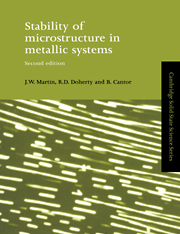Book contents
- Frontmatter
- Contents
- Preface to first edition
- Preface to second edition
- Chapter 1 The general problem of the stability of microstructure
- Chapter 2 Structural instability due to chemical free energy
- Chapter 3 Highly metastable alloys
- Chapter 4 Instability due to strain energy
- Chapter 5 Microstructural instability due to interfaces
- Chapter 6 Other causes of microstructural instability
- References
- Index
Chapter 1 - The general problem of the stability of microstructure
Published online by Cambridge University Press: 18 December 2009
- Frontmatter
- Contents
- Preface to first edition
- Preface to second edition
- Chapter 1 The general problem of the stability of microstructure
- Chapter 2 Structural instability due to chemical free energy
- Chapter 3 Highly metastable alloys
- Chapter 4 Instability due to strain energy
- Chapter 5 Microstructural instability due to interfaces
- Chapter 6 Other causes of microstructural instability
- References
- Index
Summary
Introduction
Materials science in general and metallurgy in particular are concerned with understanding both the structure of useful materials, and also the relationship between that structure and the properties of the material. On the basis of this understanding, together with a large element of empirical development, considerable improvements in useful properties have been achieved, mainly by changes in the microstructure of the material. The term microstructure as normally used covers structural features in the size range from atoms (0.3 nm) up to the external shape of the specimen at a size of millimetres or metres. These structural features include the composition, the crystal structure, the grain size, the size and distribution of additional phases and so on, all of which are controlled by the normal methods of alloying, fabrication and heat treatment.
The materials scientist, having achieved some sort of optimum microstructure for a particular property or application, has not completed the task. The important area of the stability of the microstructure remains to be considered. This concern arises since almost none of the useful structures in materials science are thermodynarnically stable: changes that will increase the total entropy or decrease the material's free energy are almost always possible. So if the original structure was an optimum one then such changes will degrade the material's structure and properties.
- Type
- Chapter
- Information
- Stability of Microstructure in Metallic Systems , pp. 1 - 27Publisher: Cambridge University PressPrint publication year: 1997

